Patagonia is one of the world’s top outdoor clothing brands. The company is known for its climate activism, commitment to fair trade practices, and quality gear, all of which have made it the go-to choice for outdoor enthusiasts around the world.
But what if you want to diversify your closet without sacrificing the performance of your gear or the sustainability of your clothes? Are there any other companies like Patagonia that deserve a spot in your gear closet?
Thankfully, there are plenty of other brands like Patagonia that are well worth checking out. To help you out, we’ve compiled a list of the 10 best companies like Patagonia for all your outdoor apparel needs.
Let’s get started.
Patagonia: An Overview
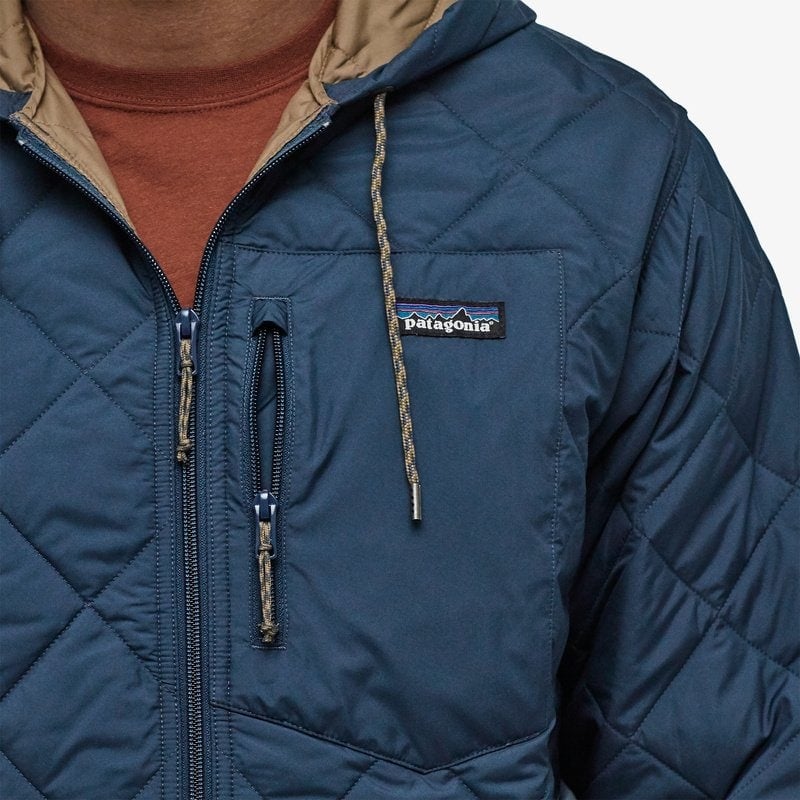
In the outdoor industry, there are few brands as popular and beloved as Patagonia. Let’s take a quick look at the history of Patagonia and what makes the company so special.
History of Patagonia
The company got its start in 1973 when world-renowned rock climber and mountaineer Yvon Chouinard opened the Great Pacific Iron Works in Ventura, California.
But, while Patagonia’s first store didn’t open until 1973, the company’s roots date back to the late 1950s. In 1957, Chouinard bought his first coal-fired forge and anvil from a junkyard in California. He taught himself to blacksmith so that he could make a piece of climbing equipment called a piton.
Chouinard then started selling his hand-made climbing gear out of the back of his car so he could make enough money to survive and climb. When he wasn’t selling gear, Chouinard was out climbing and throughout the 1950s, 1960s, and 1970s, he helped establish some of the most famous climbing routes in the world.
This small backyard operation eventually became a company called Chouinard Equipment, which Chouinard founded with his friend and fellow top climber Tom Frost. The company primarily made pitons, carabiners, and other climbing hardware, but in the 1970s, the idea for Patagonia as a clothing brand was born.
In 1970, Chouinard went on a winter climbing trip to Scotland and bought a rugby shirt to wear while climbing. When Chouinard brought this durable rugby shirt back to the US, it became a hit among climbers. He eventually started selling these shirts and other European-sourced clothing to US-based mountaineers.
Chouinard’s big break, however, came in 1973 when his wife, Malinda, discovered the wonders of synthetic pile fleece for outdoor clothing. This pile fleece was the foundation for what would later become Patagonia’s Synchilla fleece fabric and the beginning of the company that we know today.
Patagonia Ethics & Sustainability
Patagonia has always been a major driver behind the push toward ethical manufacturing and sustainability in the outdoor industry.
The company has been heavily involved in environmental activism on local, national, and international scales since the 1980s. In more recent years, Patagonia has also made a push toward using only ethical labor in its entire production line.
Some of its biggest initiatives and credentials include:
- 1% For The Planet:
Patagonia has been a member of 1% For The Planet since 2002. In fact, Patagonia was one of the founding members of the organization. The company has donated 1% of all its sales to environmental organizations since 1985 - Fair Trade Certified:
Nearly every item produced by Patagonia since 2014 features the Fair Trade Certified logo. This logo indicates that these items were produced by people who are paid a living wage and who are employed by factories with humane working conditions. - Patagonia Action Works – One of the company’s newest initiatives, Patagonia Action Works is a fund from Patagonia that helps support environmental organizations around the world. The fund primarily works with smaller grassroots organizations and it lets any group apply for money and resources to further their environmental missions.
- Certified B Corp – Certified B Corporations are companies that have demonstrated high standards of transparency and performance when it comes to their social and environmental impact. Patagonia has been a Certified B Corp since 2011.
- Ironclad Guarantee – Everything that Patagonia produces is backed by the company’s Ironclad Guarantee. If there’s an issue with any product that you buy from Patagonia, they’ll repair, replace, or refund it—no questions asked. The company also provides reasonably priced repairs for gear that is damaged due to normal wear and tear, demonstrating its commitment to durability in its product line.
- Worn Wear – Worn Wear is a Patagonia program that lets you trade in any of your gently used Patagonia gear for store credit. The company then sells your used gear online. This helps to extend the life of your gear, reduce your carbon, water, and waste footprint, and provide more affordable clothing for others in the outdoor community.
You may also like: North Face vs Eddie Bauer: Which Brand Is Best For You?
10 of the Best Patagonia-Like Brands to Check Out
It’s hard to deny Patagonia’s place as a leader in the outdoor industry. But there are plenty of other good clothing brands and companies like Patagonia that are worth shopping with, too. Here are 10 of the best Patagonia-like brands that offer similar levels of commitment to sustainable and ethical gear.
1. PrAna
Patagonia’s biggest competitor on the sustainability front is easily PrAna. The company was founded in 1992 in a garage in California as a way to create more sustainable and stylish activewear for outdoor adventures.
PrAna has come a long way since its humble roots and it’s now the go-to choice for climbers, hikers, and yogis everywhere. They primarily produce outdoor-influenced casual clothing, but you can also find a range of technical wear in PrAna’s line-up.
What sets PrAna apart from the competition is the company’s adherence to excellent sustainability practices.
The company uses low-impact materials like organic cotton and organic hemp as well as recycled polyester. PrAna is also a member of the Fair Labor Association and most of its clothing is both bluesign approved and Fair Trade Certified.
Additionally, PrAna also uses only Responsible Down Standard (RDS) certified down in its puffy jackets to help ensure the humane treatment of animals involved in its supply chains. PrAna is also a founding member of the Responsible Packaging Movement, which works to eliminate unnecessary single-use plastics from manufacturing.
2. Cotopaxi
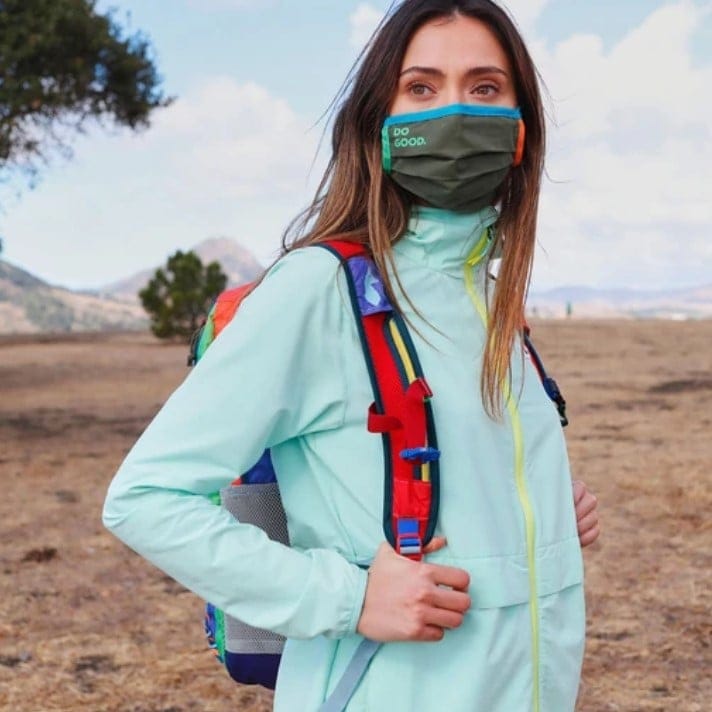
Established in 2014, Cotopaxi is an industry leader in all things ethical and sustainable. The company was founded by Davis Smith, a Utah-born entrepreneur who lived throughout Latin America during his childhood.
After founding a handful of other companies after graduating from college, Smith came up with the idea for Cotopaxi. It’s goal? To produce top-of-the-line outdoor gear while also using its profits to alleviate poverty around the world.
These days, Cotopaxi is known for its super-brightly colored backpacks, jackets, and pants. The company is a Certified B Corp that labels its products as “sustainable by design.”
All of Cotopaxi’s products are produced in factories that provide ethical working conditions for employees. Most of the company’s clothing and gear is Fair Trade Certified, too, and its down insulation meets Responsible Down Standards.
Cotopaxi also has a new program called the Three Rs, which hopes to use only repurposed, recycled, or responsible materials in its products by 2025. It even has a line of gear called the (Re)Purpose Collection, which uses only remnant fabric (the fabric that’s leftover after other companies produce clothing and equipment) in its production.
3. Title Nine
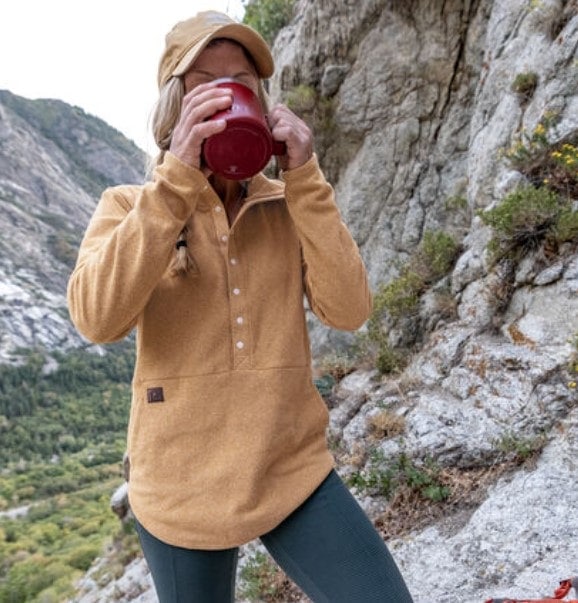
Title Nine is one of the smallest companies on our list, but it’s worthy of a spot as a top Patagonia-like brand nonetheless. The firm makes athletic wear and outdoor clothing and it’s one of the few wholly women-owned and founded companies in the outdoor industry.
When it comes to sustainability, Title Nine actually partners with another company on our list, Toad&Co, to help ensure that their gear is produced with methods and fabrics that are sustainable as possible.
What makes Title Nine unique, however, is its commitment to promoting women’s rights at all levels of its organization and in the wider community.
Title Nine employs actual women athletes to model in all of its catalogs and promotional materials rather than relying on traditional modeling agencies. Most of the company’s stores and offices are staffed by women, too.
Additionally, Title Nine sponsors a cool program called T9 Movers & Makers that provides funding and support to entrepreneurial women around the world. The company runs an annual pitchfest that helps identify and fund promising new women-owned organizations. Some of its most successful pitchfest participants include Wild Rye, NoSo Patches, and Mana Threads.
4. Toad&Co
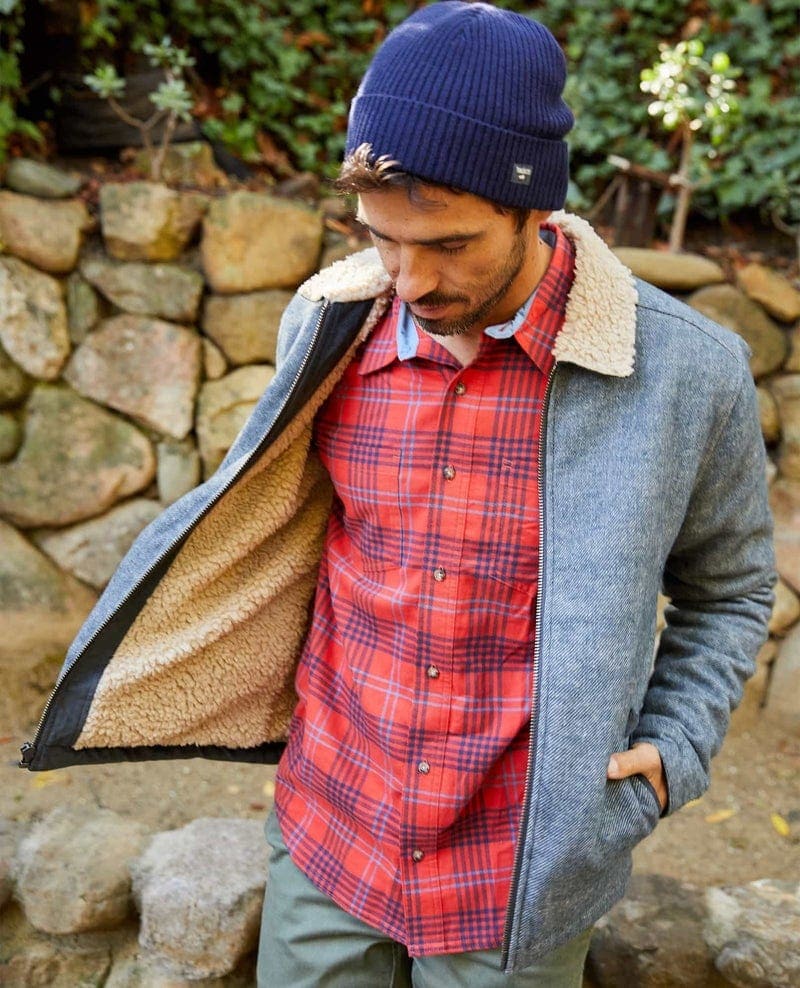
Toad&Co is a popular outdoor clothing brand that specializes in functional yet stylish and eco-friendly designs. The company was founded in 1995 in Telluride, Colorado but it has since expanded to become an international organization with hundreds of employees around the globe.
Patagonia and Toad&Co share many awesome features. Most of Toad&Co’s products are made using bluesign approved materials and the company almost exclusively uses eco-friendly fabrics in its production. This includes the use of sustainable fibers like organic cotton and hemp as well as recycled and vegan materials.
Toad&Co’s garments almost always boast a STANDARD 100 by OEKO-TEX certification, which is only given to fabrics that are free from over 100 harmful chemicals. The company also offers an option to have your gear shipped in a reusable LimeLoop Mailer package whenever you order online to help reduce the carbon footprint of your equipment.
Finally, Toad&Co partners with a number of environmental organizations to help fund conservation projects around the world. Some of Toad&Co’s many partners include The Conservation Alliance, Environmental Defense Center, Ventura Land Trust, and Community Environmental Council.
5. Páramo
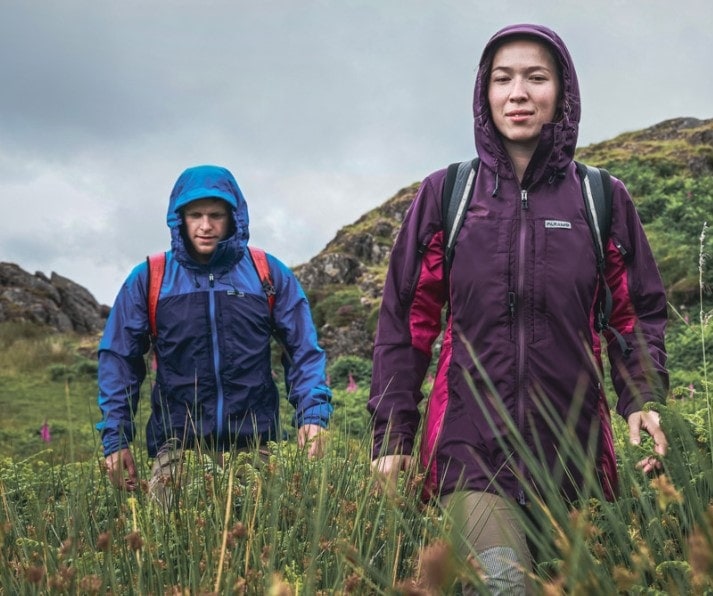
Páramo is an outdoor clothing company founded by Nick Brown, of Nikwax fame. The firm is named after the páramo, an alpine tundra-like ecosystem that’s found throughout the Andes. It was established out of a drive to create quality outdoor gear that’s both environmentally and socially responsible.
These days, Páramo is perhaps best known for its waterproof outdoor gear, which includes everything from rain jackets to its iconic anorak. Páramo’s gear is designed to last longer than nearly any other waterproof garment on the market because it uses a heavy-duty Nikwax Analogy fabric that can provide weather protection for decades.
All of Páramo’s gear is made without the use of hazardous PFCs (perfluorocarbons), which have long been used to make outdoor gear more water-repellent. The company manufactures its waterproofing materials in its UK factory to help ensure that no harmful chemicals are used in its gear.
Páramo also has one of the coolest recycling schemes in the outdoor industry. If you ever have a piece of Páramo equipment that doesn’t quite work anymore, the company will take it back and give you a gift card worth between £10 and £50, depending on the item in question. Páramo then recycles your item by finding it a new home or using it to make a new garment.
Last but not least, Páramo works with environmental organizations like the World Land Trust to help protect the natural world. Each year, Páramo offsets its carbon emissions by donating to the trust and to other organizations like the European Outdoor Conservation Association.
6. Fjällräven
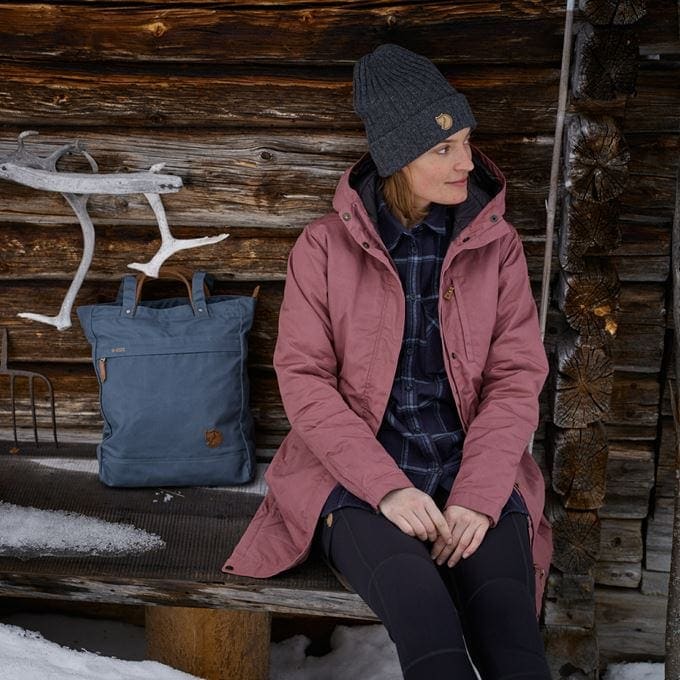
Although it was founded back in 1960, the Sweden-based Fjällräven didn’t become a major international outdoor gear company in North America until the 2000s. Since then, it’s made a name for itself in the industry by creating durable and sustainable gear that provides a mix of Scandinavian style and performance in the mountains.
Fjällräven earned a spot on our list primarily because of its commitment to sustainable design. The company’s clothing and gear are some of the most durable pieces of equipment that you’ll find on the market, and most of its products can easily last for decades if cared for properly.
Additionally, Fjällräven uses primarily sustainable materials, such as recycled polyester and G-100 Eco cotton, and it avoids chemicals like PFCs and PVCs that are flagged as dangerous by the Swedish Chemicals Group. The firm also only uses fully traceable down, and all of its animal products are sourced from animals that live in humane conditions without forced feeding.
In 2020, Fjällräven was voted the most sustainable brand in its industry by the Swedish Sustainable Brand Index. The brand is also a member of the Fair Labor Association and the Sustainable Apparel Coalition. It also has a goal to be completely carbon neutral by 2025.
7. Vaude
Established in 1975 in the southernmost part of Germany, Vaude is one of Europe’s largest outdoor gear brands. The company isn’t as well known in North America, but it’s easily one of the top Patagonia-like brands in the world.
Vaude’s gear lineup includes everything from ski apparel to outdoor-themed casualwear. All of its products are designed and made in Germany, and it has one of the most transparent supply chains in the industry.
In 2014, Vaude became an industry leader by becoming one of the first brands to publish an annual corporate responsibility report. The company only produces gear that’s made to the specs outlined by the Global Organic Textile Standard, Global Recycled Standard, Responsible Down Standard, and Responsible Wool Standard.
Plus, Vaude is a founding member of the Partnership for Sustainable Textiles and it’s a Fur Free Retailer. The firm has its own standard for environmentally friendly outdoor products called Green Shape and nearly all of its own products meet this standard.
If that wasn’t good enough, Vaude was one of the first companies ever to receive the Grüner Knopf (Green Button), a certification from the German government for textiles that are produced in ways that are socially and ecologically sustainable.
8. Arc’teryx
When it comes to quality outdoor gear, you’ll be hard-pressed to find a more reputable brand than Arc’teryx. Founded in 1989, Arc’teryx is a British Columbia, Canada-based company that makes technical clothing for hiking, climbing, and skiing in alpine environments.
Arc’teryx rivals Patagonia when performance is a concern, especially with respect to its world-famous rain jackets. The firm’s main advantage over the competition is in its dedication to creating high-end equipment that can stand the test of time and stay out of the landfill.
When it comes to producing gear, Arc’teryx uses organic cotton, Responsible Down Standard insulation, and bluesign approved materials. The company is also in the process of performing life cycle assessments on all its gear to help identify areas where it can reduce its carbon and waste footprint.
In the spirit of full transparency, it’s worth pointing out that Arc’teryx hasn’t fully phased out PFCs from its supply chain. Additionally, contrary to popular belief, the majority of the company’s gear isn’t made in Canada (though its premium rain jackets are).
That said, Arc’teryx is in the process of shifting its production toward a more sustainable future that prioritizes environmental sustainability, animal welfare, and humane working conditions for all employees. It’s in the process of getting its non-Canadian factories Fair Trade Certified, too.
9. Feathered Friends
In the world of sleeping bags, Feathered Friends is the best in the business. Feathered Friends is a Seattle-based company that’s produced cutting-edge sleeping bags since 1972.
When compared to other major brands like Mountain Hardware and The North Face, Feathered Friends isn’t as well known in the industry. But that’s because every single one of the company’s sleeping bags and jackets is hand-sewn in a Seattle factory that’s located in one of the last remaining industrial areas of the city.
Feathered Friends’ small batch production process and ethical treatment of all of its employees is the primary reason why it won a spot on our list. There are few industry-leading outdoor companies that can boast this level of quality control and traceability in all their gear.
Furthermore, all of the down that Feathered Friends uses in its gear is ethically sourced. The firm only uses down that’s Responsible Down Standard certified. This means that the birds that produce this down are never force-fed, live-plucked, or mistreated just to produce a sleeping bag.
10. Darn Tough
Finally, we have Darn Tough, a Vermont-based sock manufacturer that’s churned out some of the world’s best adventure socks since 1978.
There are a few differences between Darn Tough and Patagonia, but these mostly revolve around the fact that Darn Tough only produces socks and nothing else. If you ask us, sticking to the one thing that you’re good at isn’t exactly a bad thing, though, especially if you can produce socks that are as amazing as what you get from Darn Tough.
As far as sustainability and ethics go, Darn Tough is no slouch. All of the company’s socks are made in the US at its Vermont factory, where all workers are guaranteed ethical working conditions and a living wage.
All of Darn Tough’s socks are also made with ethically sourced merino wool that’s certified by the Responsible Wool Standard. This means that the sheep that produce this wool are never mistreated or subject to mulesing.
Darn Tough was also one of the first companies to get rid of plastic bags in its packaging, instead preferring to use FSC-certified paper, 100% recycled cardboard, and vegetable-based ink for all of its socks. What more could you ask for?










